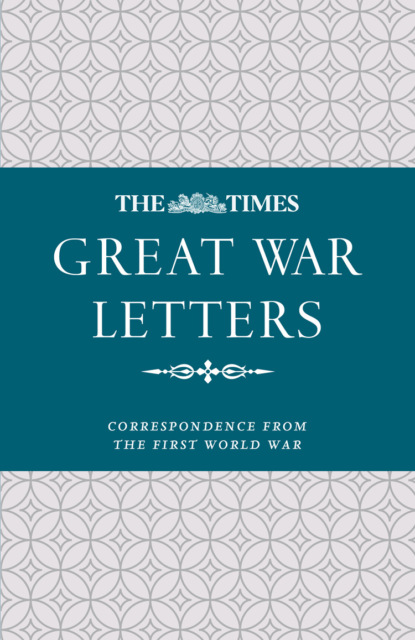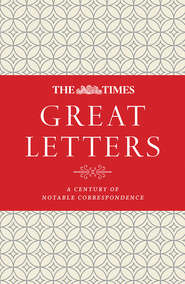По всем вопросам обращайтесь на: info@litportal.ru
(©) 2003-2024.
✖
The Times Great War Letters: Correspondence during the First World War
Автор
Год написания книги
2019
Настройки чтения
Размер шрифта
Высота строк
Поля
SIR,—I HAVE JUST returned from an official visit to the military and private hospitals organized for the care of British and French wounded at Paris and Versailles.
In many of these hospitals are German wounded. I spoke to every German wounded man that I saw and learnt from them that not only had they no complaints but were more than satisfied with the way they are tended and treated. As far as I could learn there is no difference of condition between a German wounded soldier and a British or French. I understand that in Germany there is a widespread erroneous impression that their wounded are being harshly treated by us. So strong is this belief that I hear that my brother, a colonel of the Guards, who is lying very grievously wounded in the military hospital at Frankfurt a/M, although now admirably cared for, is not allowed to be visited by German friends in retaliation for the supposed ill-treatment of their wounded by us. The German wounded in British and neutral hospitals in France are allowed to be visited by the many kind ladies who bring gifts and comforts for the wounded, and receive their share.
In view of the wide circulation of The Times, which I understand still continues in Germany, I shall be glad if you can publish this letter.
I am, Sir, your obedient servant,
LIONEL EARLE
SWISS RESORTS FOR THE WOUNDED
9 December 1914
SIR,—WILL YOU KINDLY permit me to contradict the rumours more or less prevalent to the effect that St. Moritz and the other resorts in the Engadine will not be open to visitors this winter owing to the war? St. Moritz already has a fair number of its old patrons, and although it is not expected that the season will be a full one, still the conditions now prevailing ought to encourage those who wish to enjoy their usual holiday in the High Alps to do so under favourable circumstances. Perhaps the following facts might help to dispel all hesitation:—(1) The journey out by Paris, Lyons, Culoz, and Geneva with sleeping cars is short and comfortable. Passengers may take as much luggage with them as they please. (2) There need be no fear whatever with regard to the supply of provisions; food of all sorts is abundant in Switzerland; the same may be said with regard to fuel, and there will be no lack of servants. (3) An English chaplain is already in residence at St. Moritz. (4) There are no difficulties about money; English cheques are cashed at the current rate of exchange. (5) The skating and curling rinks will be efficiently maintained as in previous years.
The hotels at St. Moritz are throwing open their doors in a very hospitable fashion to our wounded and invalid officers. A certain number of these will be received gratis, the others at merely nominal charges, and the local medical men are generously offering their professional services free. There will be no subscriptions demanded from officers for the use of rinks, or any outdoor or indoor amusements. I may here mention that the Swiss Government offers a warm welcome to our soldiers, provided they do not appear in our own uniform, and the War Office offers no objection whatever to their going.
Any officers wishing, therefore, to avail themselves of the opportunity presented to them of recruiting health and strength in the splendid climate of the Engadine are requested to apply to Georgina Countess of Dudley, British Red Cross Society, 83, Pall-mall.
I am, Sir, yours truly,
J. FRANK HOLLAND, M.D., H.B.M. Consul
GRUMBLING—AND MORE SWEATERS
11 December 1914
SIR,—THE WEATHER IS very cold, and the troops are very wet, and the mud is very bad, and the embarcation officer at Southampton sends our parcels to the German by mistake, and Mr. Penoyre proves to be an elderly alien female enemy making enormous profits out of sweaters in Mile End-road, and everything is wrong and it’s all the fault of the Government.
Thus my correspondents. Otherwise I should have thought that the Government of this country is engaged at its proper task of carrying on war advantageously with the enemy. To this end it has called for brave hearts, and is now engaged in equipping the brave bodies that contain them. But this will take till the day after to-morrow or longer, and meantime voluntary help, such as your readers have lavished through me, must do its best and keep its temper. I am very sorry, Madam, that one of your mits got into the Gloucester’s sack and the other into the Worcester’s. But would ladies please stich these most useful things together? And, yes, Madam, it is quite true that I did give your nice golf coat (the very small one of rose du Barry silk with the lace insertions) to a Belgian lady—and much comforted she was, poor thing. But would some of my kind senders mingle more discretion with their kindness?
I submit that the knell of Empire will not sound for these blunders of mine. But I do foresee grave ill if once the great civil population of these islands begins to count as a thing of any merit the little they can give and do for those who, through wet and cold and worry and waiting, give and do all for us. It is laid on us all, as never before, to do our utmost and keep, though it be a very mask for tears, a cheerful countenance.
I had almost forgotten. I want, please, a great many more sweaters to dye khaki, and a great many more ladies’ golf coats—long or short, but not the very small ones. The response to my asking for these has been prodigious, I know, but I want a great many more.
Yours faithfully,
JOHN PENOYRE
FRIGHTENED EWE FLOCKS
28 December 1914
SIR,—AT AN AUDIT dinner held here yesterday the farmers present stated that on the previous Friday night the ewe flocks for a distance of 20 miles round had been scared, had smashed through their pens, and were found scattered about the country. One farmer stated that his ewes had been penned in by iron hurdles strong enough to contain bullocks, but the sheep in their mad rush had broken them down.
The general opinion was that an aeroplane must have passed over the district and frightened the ewes, and I was asked to write to the War Office about it. The evidence of this, however—to the effect that some one in a neighbouring town was reported to have heard an aeroplane that night—is too slender to justify me in troubling the War Office at this moment. Moreover, the same thing happened three years ago, and one of the farmers present recalled a similar occurrence 20 years back, long before aeroplanes were invented.
The matter is of some importance, because an injury to our ewe flocks at this period of the year may prejudicially affect the lambing season. It is possible that the cause may be traced to some atmospheric disturbance, and it is in the hope that some one may be able to suggest the true factor in the case that I have ventured to trouble you with this letter.
Your obedient servant,
HOLCOMBE INGLEBY
1915 (#ulink_503843bb-fb8d-5b83-846e-5a219057641f)
THE SWORDS OF FALLEN OFFICERS
2 January 1915
SIR,—MANY SWORDS SENT home from the front by the regimental authorities have been so badly labelled that it has been impossible to identify them, and they lie derelict. Some also are said to have disappeared en route. The pain caused to relatives by the non-receipt of a lost one’s sword is great. Every care should be taken in the transmission of so precious a relic.
Yours,
THE FATHER OF AN OFFICER KILLED IN ACTION
“GOING WEST”
4 January 1915
SIR,—IN REFERENCE TO the question in one of your “Letters from the Front” in to-day’s issue, as to the origin of the soldiers’ expression for death—“going west”—it may be of interest to your readers to know that the idea that the souls of the departed have to journey westwards is a very ancient one. It was the belief of the ancient Egyptians and Babylonians. The sun was supposed to descend through a hole in the ground and to travel all night eastwards through the realms of the dead. Souls had thus to travel west to reach the entrance to this happy underworld. The belief is still held by many pagan peoples all over the world—Brazilians, Australians, and Fijians, among others. Dr. F. B. Jevons (“Introduction to History of Religion,” here (#litres_trial_promo)) says:—
“The funeral dirges of the Dayaks describe how the spirits of the departed have to run westwards at full speed through brake and briar over rough ground and cutting coral to keep up with the sun and slip through the crashing gates by attaching themselves to him. The ghost who could not keep up with the sun and arrive at the entrance simultaneously with him had to recommence the journey next day.”
Yours, &c.,
ETHEL M. WALLACE
THE GOVERNMENT AND THE OPPOSITION
11 January 1915
SIR,—I HAVE READ WITH the greatest surprise the following statement made by Lord Crewe in a letter in your issue of to-day:—
“My object was rather to remind the House that in the suspension of free Parliamentary attack the Opposition Party in the country might partly console themselves by the reflection that the exceptional action taken in the crisis by the Executive has in most subjects of importance been within the preliminary knowledge of one or more of their leaders, and has been taken after hearing their opinions.”
I acknowledge with thanks the courtesy of the Government in permitting Lord Lansdowne and myself to see dispatches from General French, as well as from our representatives abroad.
I have, however, received no information from the Government, which has not been given publicly, as to the steps which they have hitherto taken or the steps which they propose to take for the prosecution of the war, and I am authorized by Lord Lansdowne to state that he is in the same position.
Yours truly,
A. BONAR LAW
As Conservative Party leader, Bonar Law was the leader of the opposition. Lansdowne was the Tories’ leader in the Lords and Crewe his Liberal counterpart.
“THE GREAT WAR”
15 January 1915








